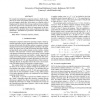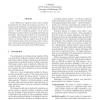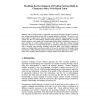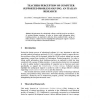217 search results - page 3 / 44 » Quantifying group problem solving with stochastic analysis |
141
Voted
ICASSP
2008
IEEE
15 years 9 months ago
2008
IEEE
The complex fast independent component analysis (c-FastICA) algorithm is one of the most popular methods for solving the ICA problem with complex-valued data. In this study, we ex...
106
click to vote
LICS
2005
IEEE
15 years 8 months ago
2005
IEEE
In the 1980s process algebras became widely accepted formalisms for describing and analysing concurrency. Extensions of the formalisms, incorporating some aspects of systems which...
145
Voted
ITS
2004
Springer
15 years 8 months ago
2004
Springer
This research describes a probabilistic approach for developing predictive models of how students learn problem-solving skills in general qualitative chemistry. The goal is to use ...
162
Voted
ECTEL
2006
Springer
15 years 6 months ago
2006
Springer
Requirements for educational software could be based on an analysis of existing learning situations. In order to obtain useful information about teaching practices, an explorative ...
103
Voted
CORR
2008
Springer
15 years 2 months ago
2008
Springer
This paper introduces a new algorithm for solving a subclass of quantified constraint satisfaction problems (QCSP) where existential quantifiers precede universally quantified ine...




